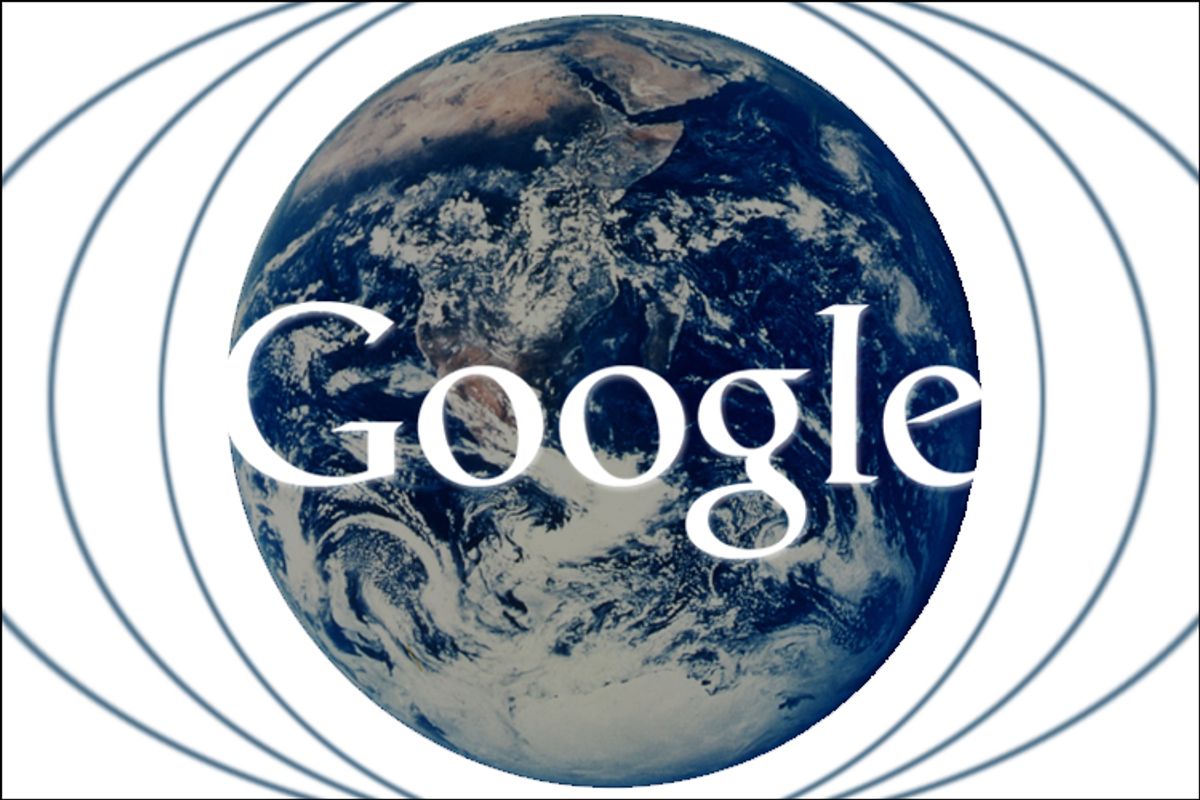Is this what world domination looks like? On Wednesday, Google announced it was building an ultrafast, one-gigabit-per-second broadband network designed to showcase "innovative" Internet applications. On Tuesday, Google launched Google Buzz, integrating social networking functions into Gmail. Last month, Google debuted its Nexus One smart phone.
So in little more than a month, Google has invaded the turf of the biggest telecommunication companies (Verizon, AT&T, etc.), directly challenged the reigning social networking giant (Facebook), and taken aim at the most fetishized gadget of the 21st century -- the iPhone (Apple).
Even Microsoft, in its heyday, was never quite that ambitious. The multiple fronts on which Google is battling -- and the huge prizes at stake -- make the old Microsoft-Netscape browser wars look like a water fight waged with busted pistols. The scale at which Google hubris is operating is absurd: We will index all the world's information, upload all the books, deploy the fastest network and design the coolest phone, while simultaneously managing your e-mail, pictures, blogs and anything else you'd care to upload to our online repositories.
There's a natural urge to react negatively to so much expansionism, and it's painfully visible if you dip into the Twitter-storm currently boiling over on the topic of "Google Buzz." People who seem to have spent no more than 10 minutes exploring the service are wondering what's the point, labeling it an "epic fail," and, most popular, questioning why the world needs yet another social networking service.
It's a valid point -- especially since Google's already toyed with at least two previous such networks (Orkut and Jaiku) . How many microblogging, status-update delivering, picture-and-video linking vehicles does one person need? With Facebook, a critical mass of my friends and family are already connected and happily sharing pictures and links and news -- why would I want to try to rebuild that functionality elsewhere? What is so compelling about, as Greg Merritt, a guy whom I am suddenly getting Google Buzz updates from simply because we exchanged some bicycle related e-mails, observed, "a long-winded Twitter with awkward privacy management and tie-ins to everything that matters except for the 800-pound gorilla of Facebook."
But there's a pretty obvious answer to that, at least for people who already use Gmail. Adding functionality to a core platform in your life is much more attractive than setting up yet another entirely new service. Integration that works can be seductive -- and Google is very, very good at making things work. I've been playing around with Google Buzz for half a day, and it is the easiest thing in the world to keep tabs on while checking my e-mail. Suddenly I find myself strongly considering making more use of Google Reader and Google's Picasa photo app just because of how simple the integration is.
Gmail, Google Maps and, of course, the Google search engine are already second nature to millions of people. We should be paying less attention to how Buzz matches up to Facebook and Twitter in isolation, and much more to how Buzz might leverage all the other pieces of Google that we already use.
At The Big Money, Chris Thompson has a very smart piece arguing that Google's real play here is for the mobile device world. Once you combine your social network with Google Maps and the GPS locator in your smart phone you open a whole new world of irresistible connectivity. A friend of mine recently demonstrated the app FourSquare on his iPhone while shopping at the local grocery store. I was mildly interested to see that there were three other FourSquare users in the Berkeley Bowl at the same time as us. I would have been considerably more interested to learn if friends or acquaintances of mine were nearby, or around the corner -- something that would be extremely easy if my Facebook network or Gmail contacts were mapped to my mobile whereabouts.
More important, Google is hoping that its ability to figure out what is "relevant" will translate into something more than just a few useful search results.
Chris Thompson:
If you’re looking for a good nearby restaurant, Google Buzz will let you scan all the public posts about establishments in your area. You can even navigate this visually, placing yourself on Google Maps and scanning a universe of public comments about anything posted in your immediate vicinity.
This is not only useful; it’s a stab at changing the paradigm of social media. With Google Buzz for Mobile, Google is attempting to make where you are and where you're going the most important criteria for ranking status updates and posts.
In other words, Google Buzz will try to show you what's most useful to you, using your network, depending on where you are and what you are doing.
At PoynterOnline Will Sullivan points to the obvious corollary: The potential for targeted advertising is immense. The more Google knows about what you like and where you are the easier it will be for ads to pop up on your phone that are genuinely useful. (Or genuinely annoying.)
Google's rivals are desperately pooh-poohing Google Buzz as nothing new. But they're just putting on a brave face. In the future, we're all going to be using smart phones as our primary interface to the networked world. Apple, Microsoft, Facebook, Google -- everyone knows that. Whoever makes that phone most useful to us as we negotiate our way through our lives will be well on its way to becoming the most powerful corporation on the planet. World domination, indeed.



Shares